- Home
- P. G. Wodehouse
The Little Warrior Page 11
The Little Warrior Read online
Page 11
CHAPTER ELEVEN
1.
The rehearsals of a musical comedy--a term which embraces "musicalfantasies"--generally begin in a desultory sort of way at thatcurious building, Bryant Hall, on Sixth Avenue just off Forty-secondStreet. There, in a dusty, uncarpeted room, simply furnished with afew wooden chairs and some long wooden benches, the chorus--or, inthe case of "The Rose of America," the ensemble--sit round a pianoand endeavor, with the assistance of the musical director, to get thewords and melodies of the first-act numbers into their heads. Thisdone, they are ready for the dance director to instil into them thesteps, the groupings, and the business for the encores, of which thatincurable optimist always seems to expect there will be at least six.Later, the principals are injected into the numbers. And finally,leaving Bryant Hall and dodging about from one unoccupied theatre toanother, principals and chorus rehearse together, running through theentire piece over and over again till the opening night of thepreliminary road tour.
To Jill, in the early stages, rehearsing was just like being back atschool. She could remember her first school-mistress, whom themusical director somewhat resembled in manner and appearance,hammering out hymns on a piano and leading in a weak soprano aneager, baying pack of children, each anxious from motives of pride toout-bawl her nearest neighbor.
The proceedings began on the first morning with the entrance of MrSaltzburg, the musical director, a brisk, busy little man withbenevolent eyes behind big spectacles, who bustled over to the piano,sat down, and played a loud chord, designed to act as a sort of bugleblast, rallying the ladies of the ensemble from the corners wherethey sat in groups, chatting. For the process of making one another'sacquaintance had begun some ten minutes before with mutualrecognitions between those who knew each other from having beentogether in previous productions. There followed rapid introductionsof friends. Nelly Bryant had been welcomed warmly by a pretty girlwith red hair, whom she introduced to Jill as Babe: Babe had awillowy blonde friend, named Lois: and the four of them had seatedthemselves on one of the benches and opened a conversation theirnumbers being added to a moment later by a dark girl with a Southernaccent and another blonde. Elsewhere other groups had formed, and theroom was filled with a noise like the chattering of starlings. In abody by themselves, rather forlorn and neglected, half a dozen solemnand immaculately dressed young men were propping themselves upagainst the wall and looking on, like men in a ball-room who do notdance.
Jill listened to the conversation without taking any great part in itherself. She felt as she had done on her first day at school, alittle shy and desirous of effacing herself. The talk dealt withclothes, men, and the show business, in that order of importance.Presently one of the young men sauntered diffidently across the roomand added himself to the group with the remark that it was a fineday. He was received a little grudgingly, Jill thought, but bydegrees succeeded in assimilating himself. A second young man driftedup; reminded the willowy girl that they had worked together in thewestern company of "You're the One"; was recognized and introduced;and justified his admission to the circle by a creditable imitationof a cat-fight. Five minutes later he was addressing the Southerngirl as "honey," and had informed Jill that he had only joined thisshow to fill in before opening on the three-a-day with the swellestlittle song-and-dance act which he and a little girl who worked inthe cabaret at Geisenheimer's had fixed up.
On this scene of harmony and good-fellowship Mr Saltzburg's chordintruded jarringly. There was a general movement, and chairs andbenches were dragged to the piano. Mr Saltzburg causing a momentarydelay by opening a large brown music-bag and digging in it like aterrier at a rat-hole, conversation broke out again.
Mr Saltzburg emerged from the bag, with his hands full of papers,protesting.
"Childrun! Chil-_drun!_ If you please, less noise and attend to me!"He distributed sheets of paper. "Act One, Opening Chorus. I will playthe melody three--four times. Follow attentively. Then we will singit la-la-la, and after that we will sing the words. So!"
He struck the yellow-keyed piano a vicious blow, producing a tinnyand complaining sound. Bending forward with his spectacles almosttouching the music, he plodded determinedly through the tune, thenencored himself, and after that encored himself again. When he haddone this, he removed his spectacles and wiped them. There was apause.
"Izzy," observed the willowy young lady chattily, leaning across Jilland addressing the Southern girl's blonde friend, "has promised me asunburst!"
A general stir of interest and a coming close together of heads.
"What! Izzy!"
"Sure, Izzy."
"Well!"
"He's just landed the hat-check privilege at the St Aurea!"
"You don't say!"
"He told me so last night and promised me the sunburst. He was,"admitted the willowy girl regretfully, "a good bit tanked at thetime, but I guess he'll make good." She mused awhile, a ratheranxious expression clouding her perfect profile. She looked like ameditative Greek Goddess. "If he doesn't," she added with maidenlydignity, "it's the las' time _I_ go out with the big stiff. I'd tie acan to him quicker'n look at him!"
A murmur of approval greeted this admirable sentiment.
"Childrun!" protested Mr Saltzburg. "Chil-drun! Less noise andchatter of conversation. We are here to work! We must not waste time!So! Act One, Opening Chorus. Now, all together. La-la-la . . ."
"La-la-la . . ."
"Tum-tum-tumty-tumty . . ."
"Tum-tum-tumty . . ."
Mr Saltzburg pressed his hands to his ears in a spasm of pain.
"No, no, no! Sour! Sour! Sour! . . . Once again. La-la-la . . ."
A round-faced girl with golden hair and the face of a wonderingcherub interrupted, speaking with a lisp.
"Mithter Thalzburg."
"Now what is it, Miss Trevor?"
"What sort of a show is this?"
"A musical show," said Mr Saltzburg severely, "and this is arehearsal of it, not a conversazione. Once more, please . . ."
The cherub was not to be rebuffed.
"Is the music good, Mithter Thalzburg?"
"When you have rehearsed it, you shall judge for yourself. Come, now. . ."
"Is there anything in it as good as that waltz of yours you played uswhen we were rehearthing 'Mind How You Go?' You remember. The onethat went . . ."
A tall and stately girl, with sleepy brown eyes and the air of aduchess in the servants' hall, bent forward and took a kindlyinterest in the conversation.
"Oh, have you composed a varlse, Mr Saltzburg?" she asked withpleasant condescension. "How interesting, really! Won't you play itfor us?"
The sentiment of the meeting seemed to be unanimous in favor ofshelving work and listening to Mr Saltzburg's waltz.
"Oh, Mr Saltzburg, do!"
"Please!"
"Some one told me it was a pipterino!"
"I cert'nly do love waltzes!"
"Please, Mr Saltzburg!"
Mr Saltzburg obviously weakened. His fingers touched the keysirresolutely.
"But, childrun!"
"I am sure it would be a great pleasure to all of us," said theduchess graciously, "if you would play it. There is nothing I enjoymore than a good varlse."
Mr Saltzburg capitulated. Like all musical directors he had in hisleisure moments composed the complete score of a musical play andspent much of his time waylaying librettists on the Rialto and tryingto lure them to his apartment to listen to it, with a view tobusiness. The eternal tragedy of a musical director's life iscomparable only to that of the waiter who, himself fasting, has toassist others to eat, Mr Saltzburg had lofty ideas on music, and hissoul revolted at being compelled perpetually to rehearse and directthe inferior compositions of other men. Far less persuasion than hehad received today was usually required to induce him to play thewhole of his score.
"You wish it?" he said. "Well, then! This waltz, you will understand,is the theme of a musical romance which I have composed. It will besung once in the first act by th
e heroine, then in the second act asa duet for heroine and hero. I weave it into the finale of the secondact, and we have an echo of it, sung off stage, in the third act.What I play you now is the second-act duet. The verse is longer. So!The male voice begins."
A pleasant time was had by all for ten minutes.
"Ah, but this is not rehearsing, childrun!" cried Mr Saltzburgremorsefully at the end of that period. "This is not business. Comenow, the opening chorus of act one, and please this time keep on thekey. Before, it was sour, sour. Come! La-la-la . . ."
"Mr Thalzburg!"
"Miss Trevor?"
"There was an awfully thweet fox-trot you used to play us. I do wish. . ."
"Some other time, some other time! Now we must work. Come! La-la-la. . ."
"I wish you could have heard it, girls," said the cherub regretfully."Honetht, it wath a lalapalootha!"
The pack broke into full cry.
"Oh, Mr Saltzburg!"
"Please, Mr Saltzburg!"
"Do play the fox-trot, Mr Saltzburg!"
"If it is as good as the varlse," said the duchess, stooping oncemore to the common level, "I am sure it must be very good indeed."She powdered her nose. "And one so rarely hears musicianly musicnowadays, does one?"
"Which fox-trot?" asked Mr Saltzburg weakly.
"Play 'em all!" decided a voice on the left.
"Yes, play 'em all," bayed the pack.
"I am sure that that would be charming," agreed the duchess,replacing her powder-puff.
Mr Saltzburg played 'em all. This man by now seemed entirely lost toshame. The precious minutes that belonged to his employers and shouldhave been earmarked for "The Rose of America" flitted by. The ladiesand gentlemen of the ensemble, who should have been absorbing andlearning to deliver the melodies of Roland Trevis and the lyrics ofOtis Pilkington, lolled back in their seats. The yellow-keyed pianorocked beneath an unprecedented onslaught. The proceedings had begunto resemble not so much a rehearsal as a home evening, and gratefulglances were cast at the complacent cherub. She had, it was felt,shown tact and discretion.
Pleasant conversation began again.
". . . And I walked a couple of blocks, and there was exactly the samemodel in Schwartz and Gulderstein's window at twenty-six fifty . . ."
". . . He got on at Forty-second Street, and he was kinda fresh fromthe start. I could see he was carrying a package. At Sixty-sixth hecame sasshaying right down the car and said 'Hello, patootie!' Well,I drew myself up . . ."
". . . 'Even if you are my sister's husband,' I said to him. Oh, Isuppose I got a temper. It takes a lot to arouse it, y'know, but Ic'n get pretty mad . . ."
". . . You don't know the half of it, dearie, you don't know the halfof it! A one-piece bathing suit! Well, you could call it that, butthe cop on the beach said it was more like a baby's sock. And when . . ."
". . . So I said 'Listen, Izzy, that'll be about all from you! Myfather was a gentleman, though I don't suppose you know what thatmeans, and I'm not accustomed . . .'"
"Hey!"
A voice from the neighborhood of the door had cut into the babblelike a knife into butter; a rough, rasping voice, loud andcompelling, which caused the conversation of the members of theensemble to cease on the instant. Only Mr Saltzburg, now in a perfectfrenzy of musicianly fervor, continued to assault the decrepit piano,unwitting of an unsympathetic addition to his audience.
"What I play you now is the laughing trio from my second act. It is abuilding number. It is sung by tenor, principal comedian, andsoubrette. On the second refrain four girls will come out and twoboys. The girls will dance with the two men, the boys with thesoubrette. So! On the encore, four more girls and two more boys.Third encore, solo-dance for specialty dancer, all on stage beatingtime by clapping their hands. On repeat, all sing refrain once more,and off-encore, the three principals and specialty dancer dance thedance with entire chorus. It is a great building number, youunderstand. It is enough to make the success of any musical play, butcan I get a hearing? No! If I ask managers to listen to my music,they are busy! If I beg them to give me a libretto to set, theylaugh--ha! ha!" Mr Saltzburg gave a spirited and lifelikerepresentation of a manager laughing ha-ha when begged to disgorge alibretto. "Now I play it once more!"
"Like hell you do!" said the voice. "Say, what is this, anyway? Aconcert?"
Mr Saltzburg swung round on the music-stool, a startled andapprehensive man, and nearly fell off it. The divine afflatus lefthim like air oozing from a punctured toy-balloon, and, like such aballoon, he seemed to grow suddenly limp and flat. He stared withfallen jaw at the new arrival.
Two men had entered the room. One was the long Mr Pilkington. Theother, who looked shorter and stouter than he really was beside hisgiraffe-like companion, was a thickset, fleshy man in the earlythirties with a blond, clean-shaven, double-chinned face. He hadsmooth yellow hair, an unwholesome complexion, and light green eyes,set close together. From the edge of the semi-circle about the piano,he glared menacingly over the heads of the chorus at the unfortunateMr Saltzburg,
"Why aren't these girls working?"
Mr Saltzburg, who had risen nervously from his stool, backed awayapprehensively from his gaze, and, stumbling over the stool, sat downabruptly on the piano, producing a curious noise like Futurist music.
"I--We--Why, Mr Goble . . ."
Mr Goble turned his green gaze on the concert audience, and spreaddiscomfort as if it were something liquid which he was sprayingthrough a hose. The girls who were nearest looked down flutteringlyat their shoes: those further away concealed themselves behind theirneighbors. Even the duchess, who prided herself on being thepossessor of a stare of unrivalled haughtiness, before which thefresh quailed and those who made breaks subsided in confusion, wasunable to meet his eyes: and the willowy friend of Izzy, for all hervictories over that monarch of the hat-checks, bowed before it like aslim tree before a blizzard.
Only Jill returned the manager's gaze. She was seated on the outerrim of the semi-circle, and she stared frankly at Mr Goble. She hadnever seen anything like him before, and he fascinated her. Thisbehavior on her part singled her out from the throng, and Mr Gobleconcentrated his attention on her.
For some seconds he stood looking at her; then, raising a stubbyfinger, he let his eye travel over the company, and seemed to beengrossed in some sort of mathematical calculation.
"Thirteen," he said at length. "I make it thirteen." He rounded on MrPilkington. "I told you we were going to have a chorus of twelve."
Mr Pilkington blushed and stumbled over his feet.
"Ah, yes . . . yes," he murmured vaguely. "Yes!"
"Well, there are thirteen here. Count 'em for yourself." He whippedround on Jill. "What's _your_ name? Who engaged you?"
A croaking sound from the neighborhood of the ceiling indicated theclearing of Mr Pilkington's throat.
"I--er--_I_ engaged Miss Mariner, Mr Goble."
"Oh, _you_ engaged her?"
He stared again at Jill. The inspection was long and lingering, andaffected Jill with a sense of being inadequately clothed. Shereturned the gaze as defiantly as she could, but her heart wasbeating fast. She had never yet beer frightened of any man, but therewas something reptilian about this fat, yellow-haired individualwhich disquieted her; much as cockroaches had done in her childhood.A momentary thought flashed through her mind that it would behorrible to be touched by him. He looked soft and glutinous.
"All right," said Mr Goble at last, after what seemed to Jill manyminutes. He nodded to Mr Saltzburg. "Get on with it! And try workinga little this time! I don't hire you to give musical entertainments."
"Yes, Mr Goble, yes. I mean no, Mr Goble!"
"You can have the Gotham stage this afternoon," said Mr Goble. "Callthe rehearsal for two sharp."
Outside the door, he turned to Mr Pilkington.
"That was a fool trick of yours, hiring that girl. Thirteen! I'd assoon walk under a ladder on a Friday as open in New York with achorus of thirteen. Well, it don't m
atter. We can fire one of 'emafter we've opened on the road." He mused for a moment. "Darnedpretty girl, that!" he went on meditatively. "Where did you gether?"
"She--ah--came into the office, when you were out. She struck me asbeing essentially the type we required for our ensemble, soI--er--engaged her. She--" Mr Pilkington gulped. "She is a charming,refined girl!"
"She's darned pretty," admitted Mr Goble, and went on his way wrappedin thought, Mr Pilkington following timorously. It was episodes likethe one that had just concluded which made Otis Pilkington wish thathe possessed a little more assertion. He regretted wistfully that hewas not one of those men who can put their hat on the side of theirheads and shoot out their chins and say to the world "Well, whatabout it!" He was bearing the financial burden of this production. Ifit should be a failure, his would be the loss. Yet somehow thiscoarse, rough person in front of him never seemed to allow him a wordin the executive policy of the piece. He treated him as a child. Hedomineered and he shouted, and behaved as if he were in sole command.Mr Pilkington sighed. He rather wished he had never gone into thisundertaking.
Inside the room, Mr Saltzburg wiped his forehead, spectacles, and hishands. He had the aspect of one wakes from a dreadful dream.
"Childrun!" he whispered brokenly. "Childrun! If yoll please, oncemore. Act One, Opening Chorus. Come! La-la-la!"
"La-la-la!" chanted the subdued members of the ensemble.
2.
By the time the two halves of the company, ensemble and principals,melted into one complete whole, the novelty of her new surroundingshad worn off, and Jill was feeling that there had never been a timewhen she had not been one of a theatrical troupe, rehearsing. Thepleasant social gatherings round Mr Saltzburg's piano gave way aftera few days to something far less agreeable and infinitely morestrenuous, the breaking-in of the dances under the supervision of thefamous Johnson Miller. Johnson Miller was a little man withsnow-white hair and the india-rubber physique of a juvenile acrobat.Nobody knew actually how old he was, but he certainly looked much tooadvanced in years to be capable of the feats of endurance which heperformed daily. He had the untiring enthusiasm of a fox-terrier, andhad bullied and scolded more companies along the rocky road thatleads to success than any half-dozen dance-directors in the country,in spite of his handicap in being almost completely deaf. He had analmost miraculous gift of picking up the melodies for which it washis business to design dances, without apparently hearing them. Heseemed to absorb them through the pores. He had a blunt and arbitrarymanner, and invariably spoke his mind frankly and honestly--a habitwhich made him strangely popular in a profession where the languageof equivoque is cultivated almost as sedulously as in the circles ofinternational diplomacy. What Johnson Miller said to your face wasofficial, not subject to revision as soon as your back was turned:and people appreciated this.
Izzy's willowy friend summed him up one evening when the ladies ofthe ensemble were changing their practise-clothes after aparticularly strenuous rehearsal, defending him against the Southerngirl, who complained that he made her tired.
"You bet he makes you tired," she said. "So he does me. I'm losing mygirlish curves, and I'm so stiff I can't lace my shoes. But he knowshis business and he's on the level, which is more than you can say ofmost of these guys in the show business."
"That's right," agreed the Southern girl's blonde friend. "He doesknow his business. He's put over any amount of shows which would haveflopped like dogs without him to stage the numbers."
The duchess yawned. Rehearsing always bored her, and she had not beengreatly impressed by what she had seen of "The Rose of America."
"One will be greatly surprised if he can make a success of _this_show! I confess I find it perfectly ridiculous."
"Ithn't it the limit, honetht!" said the cherub, arranging her goldenhair at the mirror. "It maketh me thick! Why on earth is Ike puttingit on?"
The girl who knew everything--there is always one in everycompany--hastened to explain.
"I heard all about that. Ike hasn't any of his own money in thething. He's getting twenty-five per cent of the show for running it.The angel is the long fellow you see jumping around. Pilkington hisname is."
"Well, it'll need to be Rockefeller later on," said the blonde.
"Oh, they'll get thomebody down to fixth it after we've out on theroad a couple of days," said the cherub, optimistically. "Theyalwayth do. I've seen worse shows than this turned into hits. All itwants ith a new book and lyrics and a different thcore."
"And a new set of principals," said the red-headed Babe. "Did youever see such a bunch?"
The duchess, with another tired sigh, arched her well-shaped eyebrowsand studied the effect in the mirror.
"One wonders where they pick these persons up," she assentedlanguidly. "They remind me of a headline I saw in the paper thismorning--'Tons of Hams Unfit for Human Consumption.' Are any of yougirls coming my way? I can give two or three of you a lift in mylimousine."
"Thorry, old dear, and thanks ever so much," said the cherub, "but Iinstructed Clarence, my man, to have the street-car waiting on thecorner, and he'll be tho upset if I'm not there."
Nelly had an engagement to go and help one of the other girls buy aSpring suit, a solemn rite which it is impossible to conduct byoneself: and Jill and the cherub walked to the corner together. Jillhad become very fond of the little thing since rehearsals began. Shereminded her of a London sparrow. She was so small and perky and soabsurdly able to take care of herself.
"Limouthine!" snorted the cherub. The duchess' concluding speechevidently still rankled. "She gives me a pain in the gizthard!"
"Hasn't she got a limousine?" asked Jill.
"Of course she hasn't. She's engaged to be married to a demonstratorin the Speedwell Auto Company, and he thneaks off when he can getaway and gives her joy-rides. That's all the limousine she's got. Itbeats me why girls in the show business are alwayth tho crazy to makethemselves out vamps with a dozen millionaires on a string. If Maewouldn't four-flush and act like the Belle of the Moulin Rouge, she'dbe the nithest girl you ever met. She's mad about the fellow she'sengaged to, and wouldn't look at all the millionaires in New York ifyou brought 'em to her on a tray. She's going to marry him as thoonas he's thaved enough to buy the furniture, and then she'll thettledown in Harlem thomewhere and cook and mind the baby and regularly beone of the lower middle classes. All that's wrong with Mae ith thatshe's read Gingery Stories and thinkth that's the way a girl has toact when she'th in the chorus."
"That's funny," said Jill. "I should never have thought it. Iswallowed the limousine whole."
The cherub looked at her curiously. Jill puzzled her. Jill had,indeed, been the subject of much private speculation among hercolleagues.
"This is your first show, ithn't it?" she asked.
"Yes."
"Thay, what are you doing in the chorus, anyway?"
"Getting scolded by Mr Miller mostly, it seems to me."
"Thcolded by Mr Miller! Why didn't you say 'bawled out by Johnny?'That'th what any of the retht of us would have said."
"Well, I've lived most of my life in England. You can't expect me totalk the language yet."
"I thought you were English. You've got an acthent like the fellowwho plays the dude in thith show. Thay, why did you ever get into theshow business?"
"Well . . . well, why did you? Why does anybody?"
"Why did I? Oh, I belong there. I'm a regular Broadway rat. Iwouldn't be happy anywhere elthe. I was born in the show business.I've got two thithters in the two-a-day and a brother in thtock outin California and dad's one of the betht comedians on the burlethquewheel. But any one can thee you're different. There's no reathon whyyou should be bumming around in the chorus."
"But there is. I've no money, and I can't do anything to make it."
"Honetht?"
"Honest."
"That's tough." The cherub pondered, her round eyes searching Jill'sface. "Why don't you get married?"
Jill laughed.
/> "Nobody's asked me."
"Somebody thoon will. At least, if he's on the level, and I think heis. You can generally tell by the look of a guy, and, if you ask me,friend Pilkington's got the license in hith pocket and the ring allordered and everything."
"Pilkington!" cried Jill, aghast.
She remembered certain occasions during rehearsals, when, while thechorus idled in the body of the theatre and listened to theprincipals working at their scenes, the elongated Pilkington hadsuddenly appeared in the next seat and conversed sheepishly in a lowvoice. Could this be love? If so, it was a terrible nuisance. Jillhad had her experience in London of enamoured young men who, runningtrue to national form, declined to know when they were beaten, andshe had not enjoyed the process of cooling their ardor. She had akind heart, and it distressed her to give pain. It also got on hernerves to be dogged by stricken males who tried to catch her eye inorder that she might observe their broken condition. She recalled onehouse-party in Wales where it rained all the time and she had beencooped up with a victim who kept popping out from obscure corners andbeginning all his pleas with the words "I say, you know . . . !" Shetrusted that Otis Pilkington was not proposing to conduct a wooing onthose lines. Yet he had certainly developed a sinister habit ofpopping out at the theatre. On several occasions he had startled herby appearing at her side as if he had come up out of a trap.
"Oh, no!" cried Jill.
"Oh, yeth!" insisted the cherub, waving imperiously to an approachingstreet-car. "Well, I must be getting uptown. I've got a date. Theeyou later."
"I'm sure you're mistaken."
"I'm not."
"But what makes you think so?"
The cherub placed a hand on the rail of the car, preparatory toswinging herself on board.
"Well, for one thing," she said, "he'th been stalking you like anIndian ever since we left the theatre! Look behind you. Good-bye,honey. Thend me a piece of the cake!"
The street-car bore her away. The last that Jill saw of her was awide and amiable grin. Then, turning, she beheld the snake-like formof Otis Pilkington towering at her side.
Mr Pilkington seemed nervous but determined. His face was half hiddenby the silk scarf that muffled his throat, for he was careful of hishealth and had a fancied tendency to bronchial trouble. Above thescarf a pair of mild eyes gazed down at Jill through theirtortoiseshell-rimmed spectacles. It was hopeless for Jill to try totell herself that the tender gleam behind the glass was not thelove-light in Otis Pilkington's eyes. The truth was too obvious.
"Good evening, Miss Mariner," said Mr Pilkington, his voice soundingmuffled and far away through the scarf. "Are you going up-town?"
"No, down-town," said Jill quickly.
"So am I," said Mr Pilkington.
Jill felt annoyed, but helpless. It is difficult to bid a tactfulfarewell to a man who has stated his intention of going in the samedirection as yourself. There was nothing for it but to accept theunspoken offer of Otis Pilkington's escort. They began to walk downBroadway together.
"I suppose you are tired after the rehearsal?" enquired Mr Pilkingtonin his precise voice. He always spoke as if he were weighing eachword and clipping it off a reel.
"A little. Mr Miller is very enthusiastic."
"About the piece?" Her companion spoke eagerly.
"No; I meant hard-working."
"Has he said anything about the piece?"
"Well, no. You see, he doesn't confide in us a great deal, except totell us his opinion of the way we do the steps. I don't think weimpress him very much, to judge from what he says. But the girls sayhe always tells every chorus he rehearses that it is the worst heever had anything to do with."
"And the chor--the--er--ladies of the ensemble? What do they think ofthe piece?"
"Well, I don't suppose they are very good judges, are they?" saidJill diplomatically.
"You mean they do not like it?"
"Some of them don't seem quite to understand it."
Mr Pilkington was silent for a moment.
"I am beginning to wonder myself whether it may not be a little overthe heads of the public," he said ruefully. "When it was firstperformed . . ."
"Oh, has it been done before?"
"By amateurs, yes, at the house of my aunt, Mrs Waddesleigh Peagrim,at Newport, last Summer. In aid of the Armenian orphans. It wasextraordinarily well received on that occasion. We nearly made ourexpenses. It was such a success that--I feel I can confide in you. Ishould not like this repeated to your--your--the other ladies--it wassuch a success that, against my aunt's advice, I decided to give it aBroadway production. Between ourselves, I am shouldering practicallyall the expenses of the undertaking. Mr Goble has nothing to do withthe financial arrangements of 'The Rose of America.' Those areentirely in my hands. Mr Goble, in return for a share in the profits,is giving us the benefit of his experience as regards the managementand booking of the piece. I have always had the greatest faith in it.Trevis and I wrote it when we were in college together, and all ourfriends thought it exceptionally brilliant. My aunt, as I say, wasopposed to the venture. She holds the view that I am not a good manof business. In a sense, perhaps, she is right. Temperamentally, nodoubt, I am more the artist. But I was determined to show the publicsomething superior to the so-called Broadway successes, which are soterribly trashy. Unfortunately, I am beginning to wonder whether itis possible, with the crude type of actor at one's disposal in thiscountry, to give a really adequate performance of such a play as 'TheRose of America.' These people seem to miss the spirit of the piece,its subtle topsy-turvy humor, its delicate whimsicality. Thisafternoon," Mr Pilkington choked. "This afternoon I happened tooverhear two of the principals, who were not aware that I was withinearshot, discussing the play. One of them--these people expressthemselves curiously--one of them said that he thought it a quince:and the other described it as a piece of gorgonzola cheese! That isnot the spirit that wins success!"
Jill was feeling immensely relieved. After all, it seemed, this pooryoung man merely wanted sympathy, not romance. She had been mistaken,she felt, about that gleam in his eyes. It was not the love-light: itwas the light of panic. He was the author of the play. He had sunk alarge sum of money in its production, he had heard people criticizingit harshly, and he was suffering from what her colleagues in thechorus would have called cold feet. It was such a human emotion andhe seemed so like an overgrown child pleading to be comforted thather heart warmed to him. Relief melted her defences. And when, ontheir arrival at Thirty-fourth Street Mr Pilkington suggested thatshe partake of a cup of tea at his apartment, which was only a coupleof blocks away off Madison Avenue, she accepted the invitationwithout hesitating.
On the way to his apartment Mr Pilkington continued in the minor key.He was a great deal more communicative than she herself would havebeen to such a comparative stranger as she was, but she knew that menwere often like this. Over in London, she had frequently been madethe recipient of the most intimate confidences by young men whom shehad met for the first time the same evening at a dance. She had beenforced to believe that there was something about her personality thatacted on a certain type of man like the crack in the dam, settingloose the surging flood of their eloquence. To this class OtisPilkington evidently belonged: for, once started, he withheldnothing.
"It isn't that I'm dependent on Aunt Olive or anything like that," hevouchsafed, as he stirred the tea in his Japanese-print hung studio."But you know how it is. Aunt Olive is in a position to make it veryunpleasant for me if I do anything foolish. At present, I have reasonto know that she intends to leave me practically all that shepossesses. Millions!" said Mr Pilkington, handing Jill a cup. "Iassure you, millions! But there is a hard commercial strain in her.It would have the most prejudicial effect upon her if, especiallyafter she had expressly warned me against it, I were to lose a greatdeal of money over this production. She is always complaining that Iam not a business man like my late uncle. Mr Waddesleigh Peagrim madea fortune in smoked hams." Mr Pilkington looked at the Jap
aneseprints, and shuddered slightly. "Right up to the time of his death hewas urging me to go into the business. I could not have endured it.But, when I heard those two men discussing the play, I almost wishedthat I had done so."
Jill was now completely disarmed. She would almost have patted thisunfortunate young man's head, if she could have reached it.
"I shouldn't worry about the piece," she said. "I've read somewhereor heard somewhere that it's the surest sign of a success when actorsdon't like a play."
Mr Pilkington drew his chair an imperceptible inch nearer.
"How sympathetic you are!"
Jill perceived with chagrin that she had been mistaken after all. It_was_ the love-light. The tortoiseshell-rimmed spectacles sprayed itall over her like a couple of searchlights. Otis Pilkington waslooking exactly like a sheep, and she knew from past experience thatthat was the infallible sign. When young men looked like that, it wastime to go.
"I'm afraid I must be off," she said. "Thank you so much for givingme tea. I shouldn't be a bit afraid about the play. I'm sure it'sgoing to be splendid. Good-bye."
"You aren't going already?"
"I must. I'm very late as it is. I promised . . ."
Whatever fiction Jill might have invented to the detriment of hersoul was interrupted by a ring at the bell. The steps of MrPilkington's Japanese servant crossing the hall came faintly to thesitting-room.
"Mr Pilkington in?"
Otis Pilkington motioned pleadingly to Jill.
"Don't go!" he urged. "It's only a man I know. He has probably cometo remind me that I am dining with him tonight. He won't stay aminute. Please don't go."
Jill sat down. She had no intention of going now. The cheery voice atthe front door had been the cheery voice of her long-lost uncle,Major Christopher Selby.

 Jill the Reckless
Jill the Reckless Uncle Fred in the Springtime
Uncle Fred in the Springtime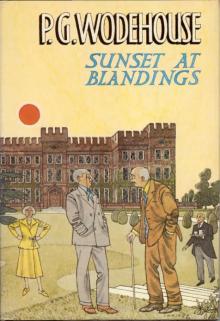 Sunset at Blandings
Sunset at Blandings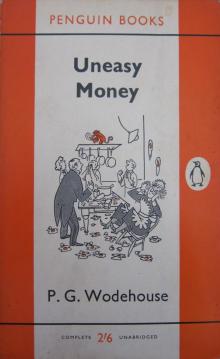 Uneasy Money
Uneasy Money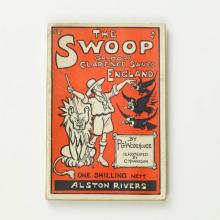 The Swoop! or, How Clarence Saved England: A Tale of the Great Invasion
The Swoop! or, How Clarence Saved England: A Tale of the Great Invasion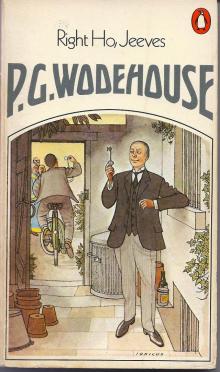 Right Ho, Jeeves
Right Ho, Jeeves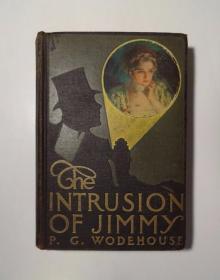 The Intrusion of Jimmy
The Intrusion of Jimmy The Jeeves Omnibus - Vol 1:
The Jeeves Omnibus - Vol 1: Aunts Aren't Gentlemen:
Aunts Aren't Gentlemen: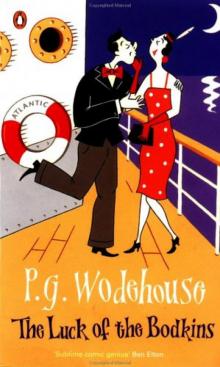 The Luck of the Bodkins
The Luck of the Bodkins The Little Nugget
The Little Nugget Money for Nothing
Money for Nothing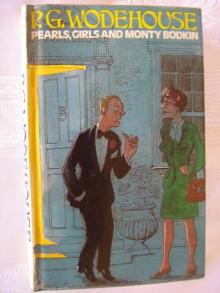 Pearls, Girls and Monty Bodkin
Pearls, Girls and Monty Bodkin Mulliner Nights
Mulliner Nights Blandings Castle and Elsewhere
Blandings Castle and Elsewhere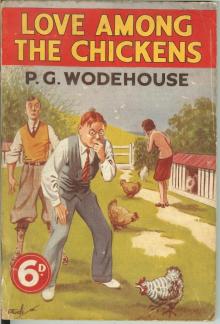 Love Among the Chickens
Love Among the Chickens Carry On, Jeeves!
Carry On, Jeeves!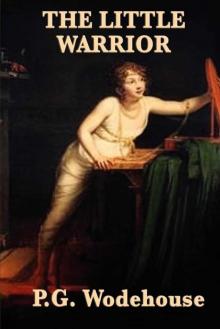 The Little Warrior
The Little Warrior Ice in the Bedroom
Ice in the Bedroom Leave It to Psmith
Leave It to Psmith Thank You, Jeeves:
Thank You, Jeeves: Money in the Bank
Money in the Bank The Man Upstairs and Other Stories
The Man Upstairs and Other Stories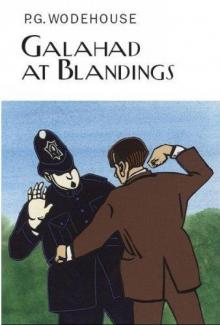 Galahad at Blandings
Galahad at Blandings The Jeeves Omnibus Vol. 5
The Jeeves Omnibus Vol. 5 Uncle Dynamite
Uncle Dynamite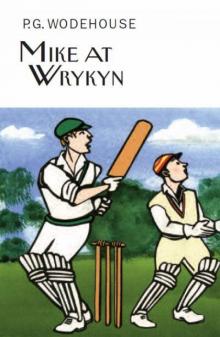 Mike at Wrykyn
Mike at Wrykyn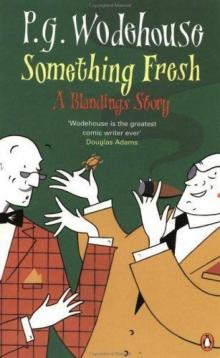 Something Fresh
Something Fresh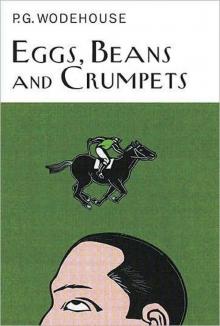 Eggs, Beans and Crumpets
Eggs, Beans and Crumpets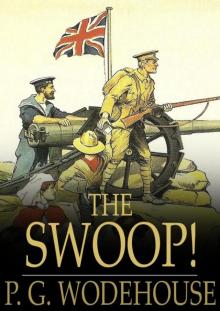 The Swoop: How Clarence Saved England (Forgotten Books)
The Swoop: How Clarence Saved England (Forgotten Books)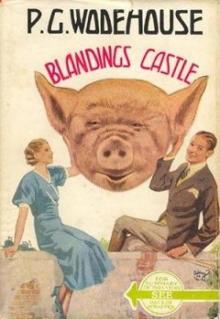 Blanding Castle Omnibus
Blanding Castle Omnibus Wodehouse at the Wicket: A Cricketing Anthology
Wodehouse at the Wicket: A Cricketing Anthology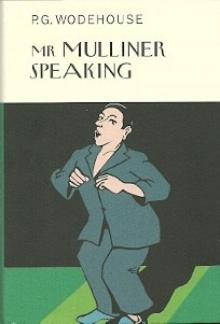 Mr. Mulliner Speaking
Mr. Mulliner Speaking Hot Water
Hot Water The Jeeves Omnibus - Vol 3: The Mating Season / Ring for Jeeves / Very Good, Jeeves
The Jeeves Omnibus - Vol 3: The Mating Season / Ring for Jeeves / Very Good, Jeeves The Mating Season
The Mating Season Meet Mr. Mulliner
Meet Mr. Mulliner The Man with Two Left Feet, and Other Stories
The Man with Two Left Feet, and Other Stories Not George Washington — an Autobiographical Novel
Not George Washington — an Autobiographical Novel Young Men in Spats
Young Men in Spats The Jeeves Omnibus Vol. 4
The Jeeves Omnibus Vol. 4 A Pelican at Blandings:
A Pelican at Blandings: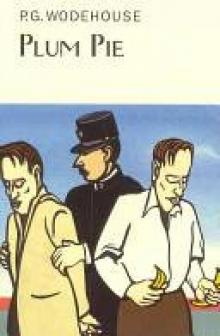 Plum Pie
Plum Pie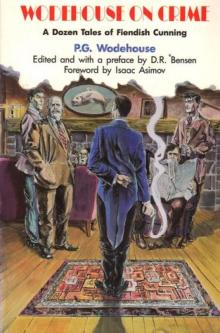 Wodehouse On Crime
Wodehouse On Crime The Jeeves Omnibus Vol. 2: Right Ho, Jeeves / Joy in the Morning / Carry On, Jeeves
The Jeeves Omnibus Vol. 2: Right Ho, Jeeves / Joy in the Morning / Carry On, Jeeves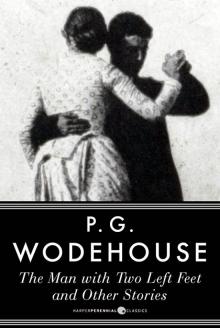 The Man With Two Left Feet
The Man With Two Left Feet Full Moon:
Full Moon: Jeeves and the Feudal Spirit:
Jeeves and the Feudal Spirit: Ring For Jeeves
Ring For Jeeves Something New
Something New The Girl on the Boat
The Girl on the Boat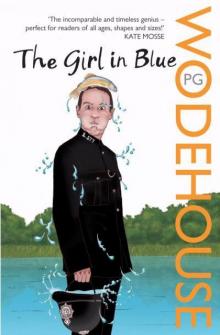 The Girl in Blue
The Girl in Blue Pigs Have Wings:
Pigs Have Wings: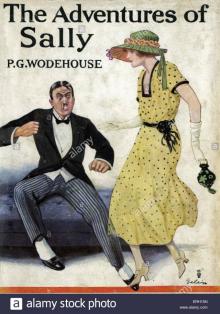 The Adventures of Sally
The Adventures of Sally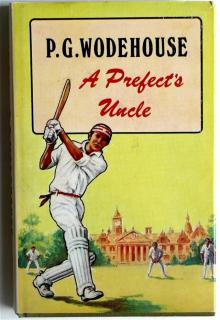 A Prefect's Uncle
A Prefect's Uncle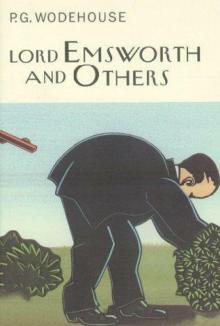 Lord Emsworth and Others
Lord Emsworth and Others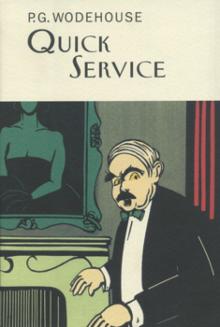 Quick Service
Quick Service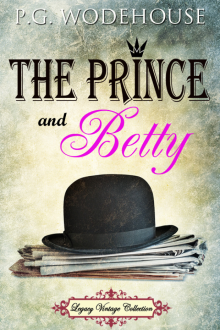 The Prince and Betty
The Prince and Betty The Gem Collector
The Gem Collector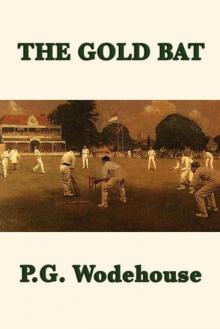 The Gold Bat
The Gold Bat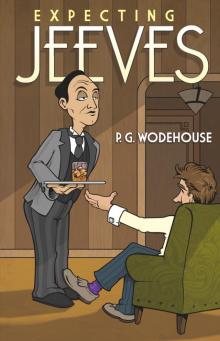 Expecting Jeeves
Expecting Jeeves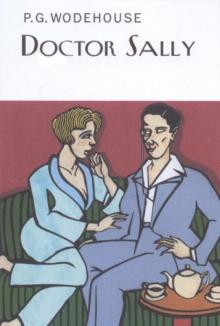 Doctor Sally
Doctor Sally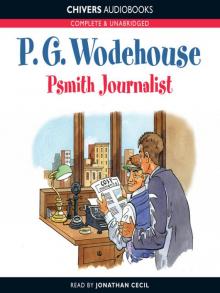 Psmith, Journalist
Psmith, Journalist The Golf Omnibus
The Golf Omnibus Heavy Weather
Heavy Weather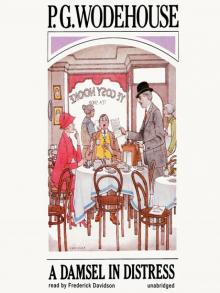 A Damsel in Distress
A Damsel in Distress The Coming of Bill
The Coming of Bill Summer Lightning
Summer Lightning Piccadilly Jim
Piccadilly Jim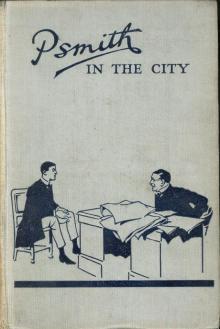 Psmith in the City
Psmith in the City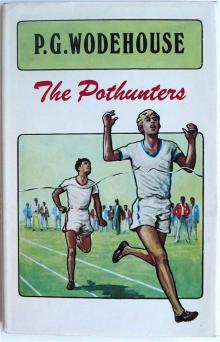 The Pothunters
The Pothunters Service With a Smile
Service With a Smile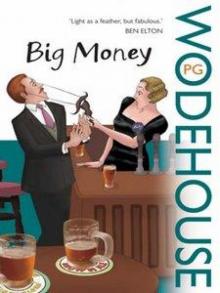 Big Money
Big Money Three Men and a Maid
Three Men and a Maid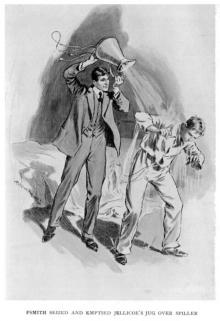 Mike and Psmith
Mike and Psmith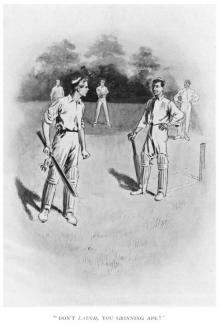 Mike
Mike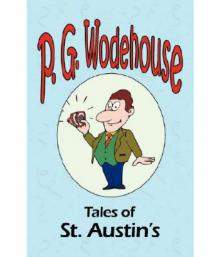 Tales of St. Austin's
Tales of St. Austin's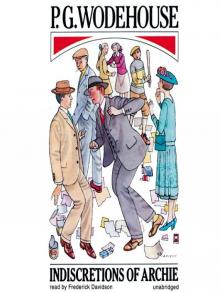 Indiscretions of Archie
Indiscretions of Archie Pigs Have Wings
Pigs Have Wings The Jeeves Omnibus - Vol 4: (Jeeves & Wooster): No.4
The Jeeves Omnibus - Vol 4: (Jeeves & Wooster): No.4 The White Feather
The White Feather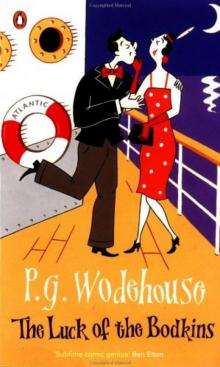 Luck of the Bodkins
Luck of the Bodkins THE SPRING SUIT
THE SPRING SUIT Full Moon
Full Moon Very Good, Jeeves
Very Good, Jeeves Thank You, Jeeves
Thank You, Jeeves Reginald's Record Knock.
Reginald's Record Knock. Wodehouse At the Wicket
Wodehouse At the Wicket LADIES AND GENTLEMEN V. PLAYERS
LADIES AND GENTLEMEN V. PLAYERS The Jeeves Omnibus - Vol 5: (Jeeves & Wooster)
The Jeeves Omnibus - Vol 5: (Jeeves & Wooster) The Jeeves Omnibus - Vol 1: (Jeeves & Wooster): No.1
The Jeeves Omnibus - Vol 1: (Jeeves & Wooster): No.1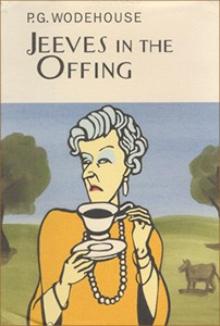 Jeeves in the offing jaw-12
Jeeves in the offing jaw-12